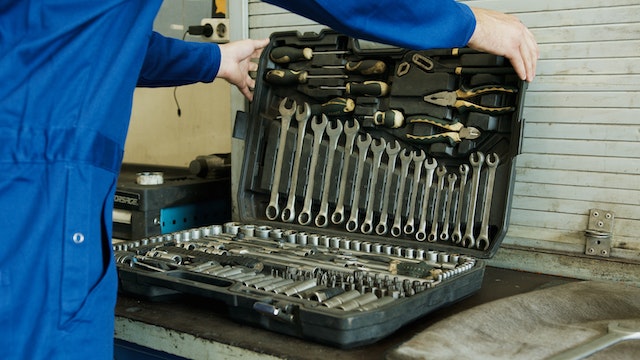There are tools mechanics use at work which they could use at home. You never know when a reliable mechanic’s toolbox will come in handy for DIY.
There are countless tools in the mechanic’s garage. They have piles of spare parts, tires that are not quite past best yet, and infinite tubs of grease. Each mechanic comes with their own tools and each garage with a handful or more mechanics. The solo auto engineer has become a thing of the past. Now everybody drives and everybody that does so requires mechanical maintenance. With garages everywhere, it’s time to turn your attention toward the multiple DIY benefits of auto repair tools.
Auto Repair Tools You can use to DIY
There are a whole host of automotive repair tools which double up on the home front. Here are a few favorites which you ought to buy, in preparation for the next big burst pipe.
The Grease Gun
You can use a grease gun anywhere you need to lubricate a joint. Grease provides protection to nuts and bolts, stops temperature extremes from doing damage, and can help with both rust and pressure. Mechanics use grease guns all the time to protect the mechanical components of engines. Grease is lubricating, prevents friction, and metallic grinding, and even stops sparks from causing fires.
You might think there are few uses for a grease gun at home, but you would be mistaken. Anywhere you have pipes, including in your wet rooms or behind your cooker, there is an opportunity for protective grease. You can use it on your children’s bikes, your own car, or anything in your home that works using moving parts.
Research the best grease gun for dual DIY and automotive purposes before you buy. Grease is particularly messy. Application is important.
Insulated Pliers
Mechanics use pliers to undo tight nuts and bolts during vehicle repair and maintenance tasks. More commonly nowadays, those pliers must be insulated. This helps with job safety and can be necessary when the mechanic is dealing with an electronic vehicle or components. Electronic engineering is a growing necessity among mechanics.
Regardless of the reasons why mechanics might use insulated tools, a set of pliers has multiple DIY functions in your home. There is a significant crossover among things like Philips head screwdrivers and wrenches between fixing your car and performing DIY maintenance on your HVAC system. If you have air conditioning at home and access to a mechanic, they use strikingly similar tools.
Impact Drivers
Sometimes known as a hammer drill, these types of drills are a little different from the normal type. Rather than tailored for use to drill woodworking projects, the impact driver uses a huge, pressurized force to drive the bolt, nail, or fastening into things like metal and concrete. A mechanic could use an impact driver to secure a bolt or stud parts together. Mechanics might also use impact wrenches and other similar tools.
In the home, an impact driver is a handy thing to have. There are times when your standard drill is not up to the task. If you want to place bolts in concrete, you need the impact driver. A hammer drill also helps in any refurbishments or kitchen/bathroom upgrades you may have planned.








